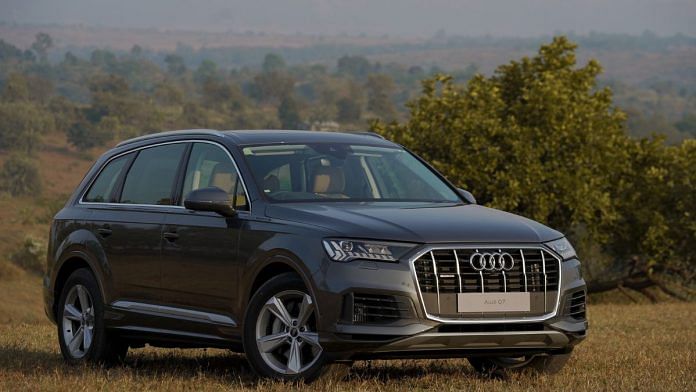Audi is synonymous with luxury and was the leading brand in the segment in India. Even Punjabi rap sung its praises, with its iconic four-ring logo becoming char choori. But in 2020, the German luxury car manufacturer saw sales crash to just 1,639 units. The government’s strict Bharat Stage 6 emission norms released in April 2020 led to them withdrawing diesel vehicles from the market. The ‘Dieselgate’ scandal also affected sales as confidence in diesel engines made by the Volkswagen group, of which Audi is a part, took a hit. All of which benefitted Audi’s German rival, Mercedes-Benz the most.
But in 2023, the four rings were shining bright again. Sales touched 7,931 units, a growth of 89 per cent from 2022 and almost a five-time increase from its lows. Balbir Singh Dhillon, head of Audi India, is not just relieved but beaming. Not only are they one of the fastest-growing luxury car brands in India once again, but sales are at an eight-year high, albeit still below their peak. The company was the first luxury brand in India to have sold over 10,000 units in a year back in 2014. But Dhillon says that the current numbers have been achieved profitably, without rampant discounting and he is especially proud that this has been done without diesel vehicles in its portfolio.
In 2021, when Audi sold 3,293 vehicles, 79 per cent of the luxury car buyers in India chose to buy diesel vehicles. In 2023, a majority of luxury car buyers, 59 per cent, in India choose petrol. This is despite the fact that a majority of luxury car buyers in India prefer Sports Utility Vehicles. “We have successfully managed to disassociate the concept that luxury SUVs need to have diesel engines”, Dhillon said to ThePrint, adding that rules like the Graded Action Response Plan (GRAP) in the National Capital Region (NCR), which forced pre-BS6 diesel vehicles off the road, has certainly helped as the region remains India’s largest luxury car market.
But India remains a very small market for luxury cars. Take Audi for example, in 2023 it sold an estimated 1.9 million cars globally. Whereas in India Audi along with others in the segment such as BMW, Jaguar Land Rover, Mercedes-Benz, Porsche and Volvo and with smaller players are expected to have sold 47,000 to 48,000 vehicles in the 2023 calendar year. Total car sales in India in 2023 were a shade above four million. “The market for luxury cars has grown as the overall market has grown, but the percentage of luxury car sales compared to the overall market remains just 1.2-1.5 per cent,” said Dhillon. Comparatively, luxury car sales make up 15-20 per cent of the overall market in Southeast Asia, according to Audi figures. Dhillon said that one major reason is high taxation. “Imports have customs duties ranging from 70-110 per cent, on top of that GST [and additional cess] on luxury vehicles is between 48-50 per cent. And then you layer road tax, registration and insurance. When you consider that the GDP per capita in India is still $2,500 and we are targeting those with an income of at least $30,000, the market is still quite limited.”
Also Read: Tata Curvv, Kia EV9 to Tesla debut—2024 is going to be big for cars in India
Not enough volume
Interestingly, Audi India has seen a huge climb in sales through their used car network, Audi Approved Plus; selling almost 3,500 cars last year, and almost a third of them are of other brands. This growing number of used car sales is not only profitable to dealers, Dhillon said that it will draw in new luxury car buyers eventually. “We are hoping that in the next buying cycle, these guys buy a new Audi instead of a used one,” he said.
But with user preferences changing and customers increasingly choosing electric vehicles in the luxury segment—an estimated 2,500 electric luxury vehicles were sold in 2023—and Tesla Motors expected to enter the Indian market this year, Audi India knows that the challenges will continue. “Only three per cent of our sales are electric today, that is because we do not have the products below 1.2 crore unlike our rivals,” said Dhillon.
That said, sales of high-end vehicles have been climbing sharply for not only Audi but also its rivals. Sales of ‘Performance and Lifestyle’ vehicles climbed to 40 per cent for the German carmaker in 2023. It’s little wonder then that most luxury carmakers have invested heavily in launching new vehicles in this class, almost all costing over a crore of rupees, in the past few months. But these are still a small fraction of overall sales of passenger vehicles in India.
And therein lies the problem, without volume, it makes little sense for Audi and its rivals to start manufacturing vehicles in India. India might be the world’s third-largest market for passenger vehicles, but it remains way behind China – their most important market. Dhillon said that it is a matter of ‘when not if’ the carmaker starts assembling vehicles in India and even starts producing a few components, but frankly admits, that “for the headquarters (in Germany), Indian numbers are still too small.”
Free-trade agreements (FTA) with the European Union and the United Kingdom are in the works and a reduction in EV import taxes is on the table. It is rumoured to benefit Tesla, and companies like Audi are hoping that it will trickle down to them as well. While that remains to be seen, Dhillon and his competitors do sense that, if 2023 is any indication, there could be a flood of luxury car sales coming soon.
@kushanmitra is an automotive journalist based in New Delhi. He is one of the jury members on the ICOTY panel. Views are personal.
(Edited by Theres Sudeep)



